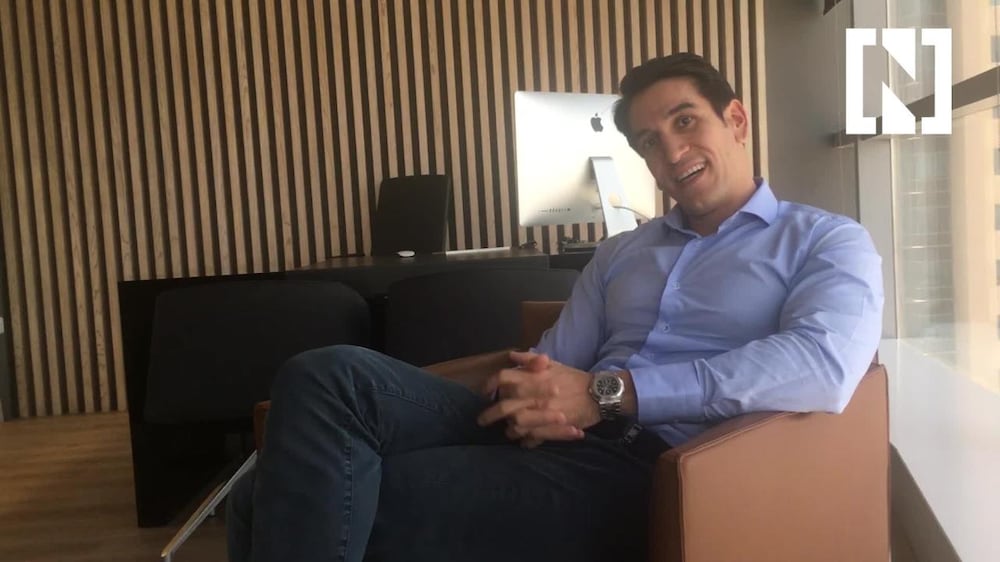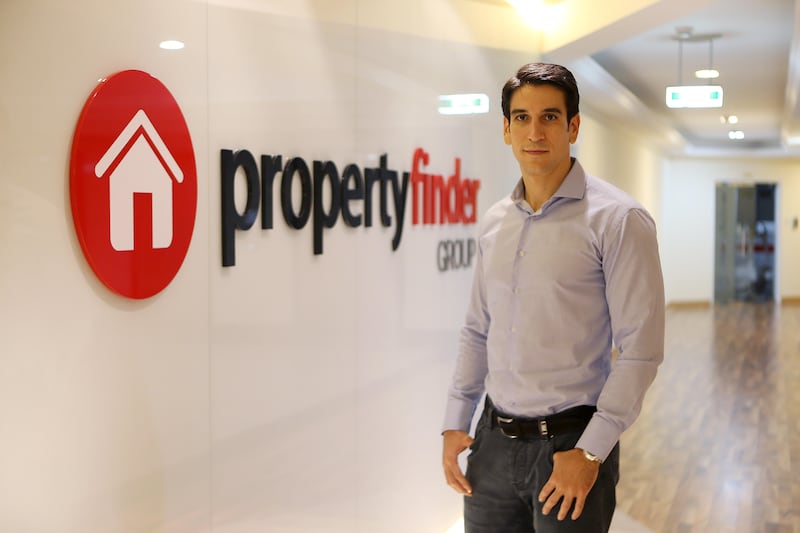There was some debate with Propertyfinder's founder and chief executive, Michael Lahyani, as to whether he should be a representative for Generation Start-up - The National's new series profiling some of the region's best start-ups and entrepreneurial ventures.
Firstly, as he points out, it has been a long time since his business could have been considered a start-up.
“We try to keep the start-up culture, definitely, because the start-up culture is fun, agile and reactive,” Mr Lahyani explains. “But a start-up business usually has reduced funding, is unprofitable and I think we’ve grown out of that phase, thankfully.”
Yet Mr Lahyani possibly has more relevant knowledge and experience to impart to entrepreneurial companies in the UAE than most of his competitors. He went through his first funding deal when his business was only a couple of years old, bought out this investor two years later in the midst of a major slump and then subsequently went through two more funding rounds. The last one, which took place 18 months ago, valued his business at US$200 million.
Mr Lahyani launched Propertyfinder in 2005 because he said it was “solving a pain”.
When it came to searching for properties either to rent or buy, he says “there was no good destination to go to".
“There were supplements of newspapers but there was nothing online.”
Generation Start-up - Propertyfinder.ae

He says that when the business started, online penetration “was below 50 per cent” for the real estate market. His firm initially published a property listings magazine that was distributed for free across the city.
The move to go online was triggered by the realisation that "we were never going to win the print war", says Mr Lahyani, especially as some competitors were offering big discounts to advertisers who signed exclusivity contracts.
The firm moved to an online-only model in 2007, but Mr Lahyani says the switch was not an easy one to make. “I don’t think the traffic was there when we did the change, but the minute you start working with online, thinking about online, that’s when it starts coming."
Momentum was only gained among its property broker clients after the global financial crisis and the subsequent slump in Dubai property.
“When markets are booming, the real estate industry is not looking for new ways of marketing,” says Mr Lahyani.
“As real estate agents started feeling the pain, they were more open to change."
The company had initially gained an investment from REA - an Australian subsidiary of News Corp - in 2007, but after the hit Dubai property took in 2009, Mr Lahyani bought this stake back and he says the business turned around within six to 12 months.
He continued to fund the business from his own resources until raising funds again - initially with Beco Capital in 2013 and 2014, and then with Vostok New Ventures in 2015. The latter bought a 10 per cent stake for $20m.
Propertyfinder had enjoyed a five-year run with revenue growth rates of between 80 to 100 per cent per year, Mr Lahyani says, before consolidating last year when it grew at about 30 per cent.
This was necessary, he says, for it to embed the proper systems and controls that a bigger company requires.
“Suddenly, you’ve gone from being a one or two-location company to a seven-location company with different regulations and taxes. And you want to be able to issue audited accounts on time.
“You want to have HR policies across the board that are working, you want to have unified tools … to have visibility throughout all your markets.
Propertyfinder now employs 260 people - about 140 in its main base in the UAE and the rest are in six other markets where it has a presence, including Saudi Arabia, Egypt and Qatar.
Mr Lahyani says all technology and product development is done in-house in Dubai.
“I think, when you’re a tech business, outsourcing your tech is a bit like if you are a restaurant and you’re outsourcing your kitchen. By the time the food comes, it will be cold and not what the customer ordered.”
He says products from other markets cannot really be imported. Propertyfinder tried to export its UAE model into Saudi Arabia and Egypt, for instance, but found that did not work.
“Search habits are different in Saudi Arabia than they are here. People here will have been exposed to internet products before they arrived in Dubai. In Saudi Arabia, less so. Therefore, the user experience needs to be a lot simpler and you don’t want to drown them with too many functionalities.”
Sites also need to be simpler in Egypt as a result of a slower mobile network.
“That has an effect on how the product appears,” Mr Lahyani says.“ For us, speed is everything - before design. A nicely designed website on your mobile, if it’s slow, doesn’t serve its purpose.”
He says in terms of traffic, the site is growing at about 100 per cent year-on-year and that the biggest opportunities for growth are in some of those markets that are not as well developed.
“The amount of people that are online coming to search for real estate is really at the beginning of that 'hockey stick' in the Middle East. That sounds crazy here in the UAE where everybody is online but we are digitalising information that has never been digitalised before.”
In Saudi Arabia, for instance, he says although there are estate agents for expensive properties, a lot of the listings that are moving online are details that “people either have on pen and paper or in their head but it’s never been put down with a description, a title, an image, a contact number and made available online”.
It is the potential of these markets that provided part of the appeal for Vostok New Ventures to buy its stake in the firm, says Bjorn von Sivers, the head of investor relations at the venture capital firm and a member of its investment committee.
Vostok New Ventures is a specialist venture capital (VC) firm with a niche in investing in online classifieds and marketplace sites in emerging economies. Its most successful investment has been in the Russian classifieds site Avito.ru - a business in which Naspers bought a majority stake in 2015 for $1.2 billion.
Mr von Sivers says Stockholm-based Vostok first became aware of Propertyfinder when broadening its geographical scope for investment outside Russia and on to the Middle East.
“We looked at a number of businesses within this niche in many markets, and then we came across Michael and we really liked Propertyfinder and how far he has taken the company.”
Mr von Sivers says both Saudi Arabia and Egypt are obvious countries for development, stating that although Egypt has the lowest GDP, it is the biggest market.
“There’s no company yet that has really taken [either market].
“There’s a big opportunity if you invest there. If you put in a lot of focus you can become the winner.”
Alex Nicholas, the co-founder of the competitor JRD Group, which owns the Justproperty.com brand, agrees. His company raised Series A funding from iMena Group in August 2015 and is also looking to expand into Saudi Arabia and Egypt. In fact, he says, it agreed the investment from iMena because of its influential Middle East backers.
“We’d been approached by a few US VCs and in my opinion they didn’t really seem to provide much, other than just the money. iMena had the regional connections.”
Its funding is partly to grow its portal regionally but also its Propspace CRM software for brokers. However, Mr Nicholas agrees that most markets outside the UAE are up for grabs.
“None of the portals have really taken any of those markets, I think it would be fair to say,” he says. “If you speak to people on the ground in Saudi Arabia, they haven’t really heard of any of the portals that are big in the UAE.”
Mr Lahyani has plenty of firepower and an experienced team around him that he hopes will be able to help it become the major player. He says it has a network of international investors “some Silicon Valley, in Asia, in Turkey, in Europe” that have been real cheerleaders for its brand.
He says raising VC funding does not become easier for the second round, as a different set of characterstics are required - investors want a clearer plan for deliverability to justify any increase in valuation and expect a more defined vision.
But his most important piece of advice for entrepreneurs thinking of raising capital is to wait as long as they possibly can before bringing in external funding.
“When I bought out REA in 2009 and Beco invested in 2013, that was a long few years on my own where I wanted to raise money.
“In hindsight, I’m so glad that I didn’t because I would have diluted myself much earlier.
“I always say to entrepreneurs when they say they are trying to raise [VC funding], ‘do you think you can get through the next 18 months without raising?’
"If the answer is yes, put your head down and keep pushing.”
business@thenational.ae






